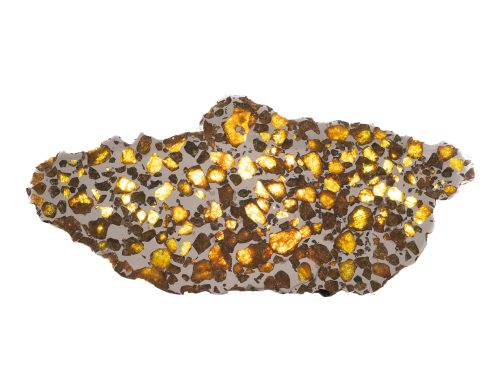Imilac
Pallasite, PMG
Found in Chile, 1822
Imilac was found in Chile in 1822 and is classified as a pallasite, perhaps the most alluring of all meteorites, and certainly of great interest to collectors and enthusiasts. They are extremely rare; pallasites consist of a nickel-iron matrix rich in colorful olivine crystals and are believed to have formed at the core/mantle boundary of large asteroids. Out of nearly 65,000 officially recognized meteorites, there are only 130 known pallasites. Of these, Imilac’s olivine grains are among the most beautiful and alluring. Some pieces, called “metal skeletons,” have also been seen on the meteorite market; these are severely weathered pieces that lack olivine grains.
The Imilac meteorite was found in the Atacama Desert, a desert plateau in South America that is the driest non-polar desert in the world. It’s been the site for a number of Mars analog experiments, whereby scientists test research and exploration methods, technology, and equipment. The desert’s otherworldly appearance has made it a popular destination for filming Mars scenes. Due to its extreme conditions – negligible cloud cover, lack of light pollution and radio interference, and high altitude – the Atacama Desert is a prime location for conducting astronomical observations, and its home to a number of astronomy projects and telescopes.
Showing the single result
